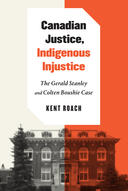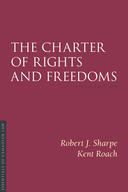
Wrongfully Convicted (Updated and Expanded Edition)
Guilty Pleas, Imagined Crimes, and What Canada Must Do to Safeguard Justice
- Publisher
- Simon & Schuster
- Initial publish date
- Apr 2023
- Category
- General, General, Criminology
-
eBook
- ISBN
- 9781668023686
- Publish Date
- Apr 2023
- List Price
- $19.80 USD
-
Paperback / softback
- ISBN
- 9781668023679
- Publish Date
- Jan 2025
- List Price
- $24.99
Add it to your shelf
Where to buy it
Description
A top legal scholar explains Canada’s national tragedy of wrongful convictions, how anyone could be caught up in them, and what we can do to safeguard justice.
Canada’s legal system has a serious problem: a significant but unknown number of people have been convicted for crimes they didn’t commit. There are famous cases of wrongful convictions, such as David Milgaard and Donald Marshall Jr., where the system convicted the wrong person for murder. But there are lesser-known cases: people who feel they have no option but to plead guilty, and people convicted of crimes that were imagined by experts or the police that never, in fact, happened.
Kent Roach, cofounder of the Canadian Registry of Wrongful Convictions, award-winning author, and law professor, has dedicated his illustrious career to documenting flaws in our justice system. His work reveals that the burden of wrongful convictions falls disproportionately on the disadvantaged, including Indigenous and racialized people, those with cognitive issues, single mothers, and the poor.
Wrongfully Convicted raises awareness about wrongful convictions at a time when DNA exonerations are less frequent and the memories of most famous wrongful convictions are fading. Roach makes a compelling case for change that governments have so far lacked the courage to make. They include better legislative regulation of police and forensic experts and the creation of a permanent and independent federal commission both to investigate wrongful convictions and their multiple causes.
Roach’s research and vast knowledge point to systemic failings in our legal system. But he also outlines vital changes that can better prevent and correct wrongful convictions. Until we do, many of the wrongfully convicted are still waiting for the promise of justice. It is an issue that affects all Canadians.
About the author
Kent Roach is a professor of law and the Prichard-Wilson Chair of Law and Public Policy at the University of Toronto Faculty of Law. He is a graduate of the University of Toronto and of Yale University, and a former law clerk to Justice Bertha Wilson of the Supreme Court of Canada. Professor Roach has been editor-in-chief of the Criminal Law Quarterly since 1998. In 2002, he was elected a Fellow of the Royal Society of Canada and in 2013 he was one of four academics awarded a Pierre Elliott Trudeau Fellowship. He is the author of twelve books, including Constitutional Remedies in Canada (winner of the Walter Owen Prize); Due Process and Victims’ Rights (shortlisted for the Donner Prize); The Supreme Court on Trial (shortlisted for the Donner Prize); Brian Dickson: A Judge’s Journey (winner of the Dafoe Prize; co-authored with Robert J. Sharpe); and The 9/11 Effect: Comparative Counter-Terrorism (winner of the David Mundell Medal). He is the co-editor of several collections of essays and published casebooks, including most recently Comparative Counter-Terrorism Law, which arose from his role as General Reporter on Counter-Terrorism Law for the XIX International Congress on Comparative Law held in 2014. With Justice Robert Sharpe, he is the co-author of The Charter of Rights and Freedoms volume in Irwin Law’s Essentials of Canadian Law series. False Security: The Radicalization of Canada’s Terror Law, co-authored with Craig Forcese, was published by Irwin Law in 2015. He has also written over 200 articles and chapters published in Australia, China, Hong Kong, India, Israel, Italy, Kenya, Singapore, South Africa, Sweden, the United Kingdom, and the United States, as well as in Canada. Professor Roach has served as research director for the Inquiry into Pediatric Forensic Pathology in Ontario (the Goudge Inquiry) and for the Commission of Inquiry into the Investigation of the Bombing of Air India Flight 182. In both capacities, he edited multiple volumes of research studies. He served on the research advisory committee for the inquiry into the rendition of Maher Arar and the Ipperwash Inquiry into the killing of Dudley George. He was a special advisor to the Truth and Reconciliation Commission on Residential Schools. Professor Roach has represented Aboriginal and civil liberties groups in many interventions before the courts, including Gladue, Wells, Ipeelee, and Anderson on sentencing Aboriginal offenders; Latimer on mandatory minimum sentences; Stillman, Dunedin Construction, Downtown East Side Sex Workers, and Ward on Charter remedies; Golden on strip searches; Khawaja on the definition of terrorism; and Corbiere and Sauvé on voting rights. He is the faculty lead for the Asper Centre for Constitutional Rights.
Editorial Reviews
“A needed wake-up call for Canadians about wrongful convictions and what should be done about them.”
— BARRY SCHECK, cofounder of the Innocence Project
“[This book] will make you sad, angry, and hopeful. Sad because Roach’s detailed account of individual wrongful conviction cases shows how injustice, often casual, wrecks lives, particularly the lives of those who lack the resources to defend themselves despite their innocence. Angry because the Canadian justice system . . . permits this state of affairs. Hopeful, for Roach gives wise and practical suggestions for safeguarding and improving justice in Canada. In particular, we should pay attention to Roach’s powerful warning about 'dirty thinking' structured by cognitive biases, shortcuts, stereotypes, and confirmation bias, thinking that easily infects and distorts the justice system.”
— PHILIP SLAYTON, bestselling author of Lawyers Gone Bad and Mighty Judgement
“From Canada's top scholar in the area of wrongful convictions comes the most comprehensive and insightful analysis we have seen to date. Roach’s book is a call to action that should be required reading for every person working in Canada’s criminal legal system and every person who cares about justice. Roach’s thoroughly researched and thought-provoking work on the topic of wrongful convictions . . . brings to our attention the many important cases of wrongful conviction in Canada that are largely unknown but demonstrate that we are in dire need of a new system to address wrongful convictions in Canada; we are currently failing the wrongly convicted, and they are languishing in our prisons. This book will become required reading for the students and lawyers that work with the UBC Innocence Project.”
— TAMARA LEVY, KC, director of the UBC Innocence Project
“Breaks new ground in unearthing and analyzing Canada’s chilling history of wrongfully convicting the innocent. Hard-hitting, accessibly written, and meticulously researched, Canada’s leading authority in the field has laid bare a plague of investigative error and governmental buck-passing that continues to this day.”
— KIRK MAKIN, award-winning journalist
“If you think you can imagine yourself being a free and innocent person one day and then an imprisoned and convicted person the next day, you’re fooling yourself. Read this book and find out about some of the people who’ve suffered this unimaginable fate at the hands of our justice system. . . . This is a plain-language, blunt, and crucial contribution to our ongoing struggle with this profound problem. Hopefully, it will motivate you to join a chorus of voices advocating for changes that are necessary to both try and prevent wrongful convictions from happening and make it fairer to correct them when they do.”
— DAVID ASPER, KC, counsel for David Milgaard
“Kent Roach uses his expertise on the causes and remedies for wrongful convictions to illuminate dark corners of the Canadian criminal justice system.”
— PETER NEUFELD, cofounder of the Innocence Project
“An extremely readable, panoramic discussion of how the Canadian justice system too often fails, resulting in the innocent being wrongly incarcerated. The nearly one hundred case studies of innocence denied are so compellingly chronicled that it was a task to pull my eyes away from the pages.”
— WILLIAM DEVERELL, award-winning author of Stung and Whipped
“A masterpiece of a wake-up call to all Canadians.”
— HARRY LaFORME, Canada’s first Indigenous appellate court judge and former trial judge
Other titles by

Canadian Justice, Indigenous Injustice
The Gerald Stanley and Colten Boushie Case

Criminal Law, 7/e

False Security
The Radicalization of Canadian Anti-Terrorism

Criminal Law, 6/e

Acting for Freedom
Fifty Years of Civil Liberties in Canada

Acting for Freedom
Fifty Years of Civil Liberties in Canada

The Charter of Rights and Freedoms, 5/e
Criminal Law 5/e

Forensic Investigations and Miscarriages of Justice
The Rhetoric Meets The Reality